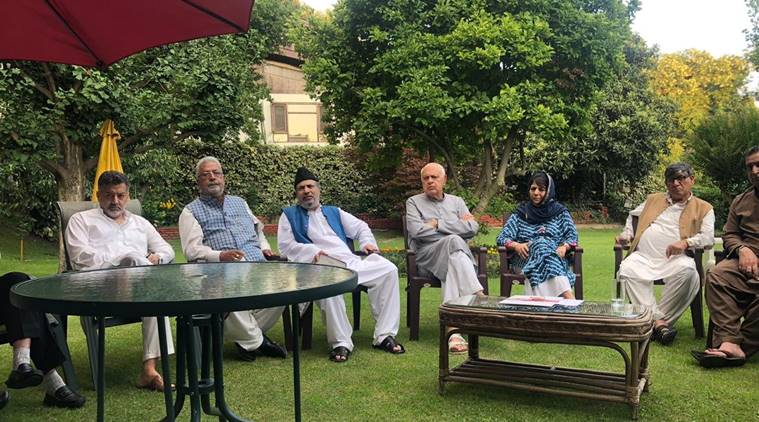


In a united front, legislators from various parties in Jammu and Kashmir, including the Awami Ittehad Party, Peoples Democratic Party, and J&K Peoples Conference, have moved a resolution against the Centre's decision to revoke Article 370 and 35A. They label the move as "unconstitutional and unilateral" and call for the immediate restoration of the articles in their original form, along with the reversal of changes introduced by the Jammu & Kashmir Reorganisation Act, 2019. The leaders urge the Union government to preserve the region's distinct identity, culture, and political autonomy, respecting its democratic and constitutional sanctity.
Revocation of Article 370 and Its Impact on Jammu and Kashmir: A Comprehensive Overview
Background
Article 370 of the Indian Constitution was a special provision that granted the state of Jammu and Kashmir a unique status within the Indian union. It allowed the state to have its own constitution, flag, and autonomous administration. The article was incorporated into the constitution in 1949, as part of the agreement between the Indian government and the state's leaders.
Revocation of Article 370
On August 5, 2019, the Indian government revoked Article 370 and Article 35A of the constitution, which gave special status to Jammu and Kashmir. The move was met with widespread protests and criticism, both within and outside the state.
The government's justification for the revocation was that it would help to integrate Jammu and Kashmir more fully into the Indian union, and to promote economic development and security in the state. However, critics argued that the move was unconstitutional and undemocratic, and that it would undermine the unique identity and autonomy of the state.
Impact on Jammu and Kashmir
The revocation of Article 370 has had a significant impact on Jammu and Kashmir. The state has been under a virtual lockdown since August 5, 2019, with restrictions on movement, communication, and assembly. Thousands of people have been arrested, and there have been reports of human rights violations.
The economic impact of the revocation has also been severe. The tourism industry has been decimated, and many businesses have been forced to close. Unemployment and poverty levels have increased, and the region is facing a humanitarian crisis.
Political Consequences
The revocation of Article 370 has also had a profound political impact. The move has deepened the alienation of the Kashmiri people, and has led to increased support for separatism. Several political parties in Jammu and Kashmir have condemned the move, and have called for the restoration of the state's special status.
The revocation has also strained relations between India and Pakistan. Pakistan has condemned the move, and has suspended diplomatic ties with India. The two countries have also exchanged fire across the border, raising fears of a wider conflict.
FAQs
1. Why was Article 370 revoked?
The Indian government's stated reason for revoking Article 370 was to integrate Jammu and Kashmir more fully into the Indian union, and to promote economic development and security in the state.
2. Is the revocation of Article 370 constitutional?
The legality of the revocation of Article 370 is currently being challenged in the Supreme Court of India. The court has yet to issue a ruling on the matter.
3. What has been the impact of the revocation on Jammu and Kashmir?
The revocation has had a devastating impact on Jammu and Kashmir. The state has been under a virtual lockdown since August 5, 2019, with restrictions on movement, communication, and assembly. Thousands of people have been arrested, and there have been reports of human rights violations. The economic impact has also been severe, with the tourism industry decimated and unemployment levels increasing.
4. What are the political consequences of the revocation?
The revocation has deepened the alienation of the Kashmiri people, and has led to increased support for separatism. Several political parties in Jammu and Kashmir have condemned the move, and have called for the restoration of the state's special status. The revocation has also strained relations between India and Pakistan.
5. What is the future of Jammu and Kashmir?
The future of Jammu and Kashmir is uncertain. The revocation of Article 370 has created a deep sense of grievance among the Kashmiri people, and it is unclear how the Indian government will reconcile these grievances with its goal of integrating the state more fully into the Indian union.

The Kasibugga Venkateswara Temple in Srikakulam district was the site of a heart-wrenching stampede, causing multiple fatalities and affecting the community deeply. Chief Minister N. Chandrababu Naidu has expressed his sorrow over the unfortunate incident, as well as directing officials to ensure that those injured receive the best medical treatment possible. As local officials and public representatives are called to oversee relief operations, swift action is required to aid those affected and manage the situation effectively.

Indian Prime Minister Narendra Modi inaugurated the Shanti Shikhar Academy for Peaceful World in Raipur, praising the Brahma Kumaris organization for bridging India's ancient wisdom with the world's search for harmony. He credited the group's selfless service and spiritual discipline for their efforts towards universal peace. He positioned the Brahma Kumaris as protectors of India's soul and highlighted India's proactive role in addressing global crises such as disaster relief and environmental threats.

In an act of solidarity and protest, millions of Muslims in India used their Friday prayers to denounce the recent killings that took place in Pahalgam. The news comes amid growing tensions between the Muslim community and the Indian government. Many are viewing this as a sign of unity and determination from the Muslim population in India.

The state of Karnataka, or Kannada Rajyotsava, marked its 69th anniversary with a grand ceremony organized by the district administration in Mangaluru. District in-charge minister Dinesh Gundu Rao paid tribute to the leaders and writers who fought for a unified Kannada state and presented awards to 80 outstanding individuals and organizations. In his address, the minister highlighted the rich cultural and historical heritage of Karnataka and called for a sense of pride among its citizens.

Telangana's 'Run for Unity' event marked the 150th birth anniversary of Sardar Vallabhbhai Patel, India's first Deputy Prime Minister and architect of national integration. The event, carrying the message of "Ek Bharat - Shreshth Bharat", honored Patel's legacy of unity, sacrifice, and nation-building. Telangana BJP President N Ramachander Rao paid tribute to Patel and highlighted his pivotal role in integrating princely states, including Hyderabad, into the Indian Union. He also commended Prime Minister Narendra Modi and Home Minister Amit Shah for upholding Patel's ideals of national integrity.

The FBI has successfully stopped a potential terrorist attack in Michigan on Halloween weekend, according to FBI Director Kash Patel. Multiple suspects have been arrested after allegedly planning a violent attack that was connected to international terrorism. The suspects, whose ages range from 16 to 20, had engaged in firearms training and mentioned "pumpkin day" as a code for Halloween. White House Senior Director for Counterterrorism Seb Gorka confirmed the thwarted attack and stated that it was intended to occur during a time when children should be enjoying themselves.

Amidst criticism over his comments on his interfaith marriage to his Hindu wife, Usha, US Vice President JD Vance reiterates the importance of mutual respect, trust, and communication in their union. While he hopes she may someday embrace his Christian faith, her decision to maintain her beliefs is respected. Despite their differences, the couple has agreed to raise their children in the Christian faith, with Usha supporting them. At a Turning Point USA event, Vance also reaffirmed the couple's balanced approach towards managing their interfaith household.

Three days after TVK leader Vijay met with the family members of the victims of the Karur tragedy, Central Bureau of Investigation (CBI) team led by Superintendent of Police Praveen Kumar visited the rally site in Velusamypuram where the deadly stampede occurred. The officers conducted inquiries with locals and studied the topography of the area, as well as Vijay's travel route. The transfer of the case to the CBI and the re-registration of the FIR remains a secret and its contents have not been made public yet.

Prime Minister Narendra Modi praised the demonstrations by the indigenous dog squad as one of the most admired parts of the Rashtriya Ekta Diwas parade at the Statue of Unity. The squad included breeds like Rampur Hounds and Mudhol Hounds, with Mudhol Hound "Riya" leading the pack. PM Modi also applauded the Assam Police's Motorcycle Daredevil Show and the cultural performances at the parade, which reflected the theme of "Unity in Diversity." The event was attended by five Shaurya Chakra awardees and 16 gallantry medal winners from the CRPF and BSF.

The FBI has announced the arrest of multiple individuals in Michigan who were planning a violent attack over the Halloween weekend. Director Kash Patel praised the vigilance of law enforcement personnel and assured the public that there was no threat to the community. These arrests come after a previous arrest in May of a Michigan man who allegedly planned an attack on a US Army facility on behalf of the Islamic State group. The suspect remains in federal custody and is expected to plead guilty.